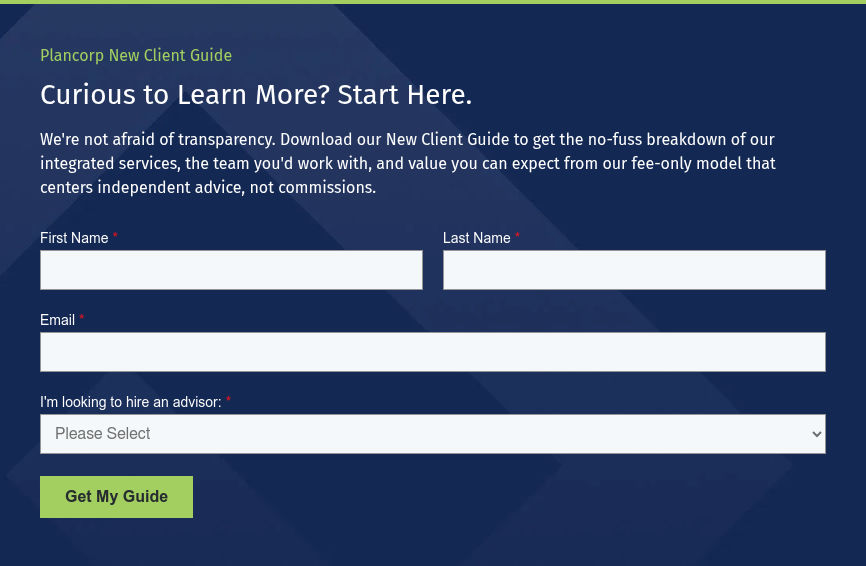Your Complete Guide to Wealth Management
What It Is, If You Need a Wealth Manager, and How to Find One
Table of Contents
When your financial life becomes more complex, the stakes get higher. Questions about investments, taxes, equity compensation, retirement, and your family’s legacy are no longer isolated decisions—they’re deeply connected. That’s where wealth management comes in.
At Plancorp, we believe wealth management isn’t just about growing your money. It’s about aligning every aspect of your financial life to support what matters most to you, with a trusted advocate who sees the full picture and acts in your best interest at every step.
In this guide, we’ll deep-dive wealth management from every angle, so you are equipped with the confidence you need as you research and interview potential firms to partner with.

What is Wealth Management?
First thing’s first: what is wealth management? Wealth management is a holistic, ongoing process that integrates financial planning, investment management, tax strategy, estate planning, and more to help high-net-worth individuals and families achieve their financial goals with confidence.
Unlike standalone services, wealth management is comprehensive. Here’s how it differs from other, more simplified approaches:
Financial Planning
Financial planning focuses on creating a roadmap for your goals: budgeting, retirement projections, education funding, and more. It’s foundational to overall wealth management, but on its own, it doesn’t include managing your investments or implementing complex tax strategies.
Investment Management
Investment management is about building and managing your portfolio to grow your wealth. However, without financial planning and tax integration, it risks being siloed from your broader goals.
Brokerage Services
Brokers typically buy and sell investments for you, often on commission. They may not provide comprehensive planning or fiduciary guidance focused on your best interest.
In short, wealth management get to know your vision for life and brings it all together – coordinating your investments, taxes, estate plan, and financial strategies under one roof, so every decision supports the next.
Who Needs Wealth Management?
Wealth management isn’t just for the ultra-wealthy – it’s for anyone whose financial life has grown complex enough that decisions in one area impact every other.
Here are some profiles of people who benefit most from a holistic, fiduciary wealth management relationship:

Corporate Executives with Equity Compensation
When your compensation package includes RSUs, stock options, or ESPPs, each decision you make can have significant tax implications. Coordinating when to exercise options, sell shares, and diversify your concentrated holdings requires integrated planning to avoid unexpected tax bills and ensure your portfolio aligns with your goals.
Explore Equity Compensation Articles:

Business Owners Planning for Succession or Exit
Selling a business is often the largest financial event in an owner’s life. Wealth management helps you prepare personally and professionally – ensuring your family’s financial security, minimizing taxes on the sale, and positioning proceeds to support retirement, charitable goals, or legacy planning.
Explore Succession Planning Articles:
>> Succession Planning 101: What Is It and Why Is It Important?
>> When You Should Develop a Succession Plan for Your Business

High-Income Professionals Seeking Coordination
Doctors, attorneys, and other professionals often have demanding careers with little time to manage finances proactively. Wealth management helps integrate tax strategy, retirement planning, insurance protection, and investments under one roof, giving peace of mind that nothing is overlooked.
Explore High-Income Planning Articles:
>> 3 Useful Employee Benefits for High Earners
>> IRS Safe Harbor Rule: How High Earners Can Avoid Estimated Tax Penalties

Families Focused on Legacy and Philanthropy
For families with multi-generational goals or charitable intentions, wealth management ensures your estate plan, investments, and giving strategies work together to maximize impact while minimizing taxes and complexity.
Explore Trust & Legacy Articles:
>> Wealth Transfer & Estate Planning: Unique Types of Trusts to Consider

Anyone Who Feels Their Financial Life is Too Complex to Navigate Alone
If you’re juggling multiple accounts, income streams, tax considerations, or goals – and want confidence that every decision is coordinated and intentional – wealth management can provide the clarity and partnership you need.
Explore Articles About the Benefits of Hiring an Advisor:
>> Is it worth paying a Wealth Manager?
>> 10 Times in Life You'll Definitely Want a Financial Advisor

Core Services Included in Wealth Management
When researching which wealth management to partner with, it is key to make sure your advisor doesn’t approach it as a single service, but rather a coordinated strategy that brings together every aspect of your financial life under one roof. Here’s what that should include:
-
Financial Planning
-
Investment Management
-
Retirement Planning
-
Strategic Tax Planning
-
Estate Planning
-
Insurance Planning
-
Equity Compensation
-
Charitable Giving
Financial Planning
At its core, wealth management includes detailed financial planning. This involves understanding your goals and creating a coordinated strategy for saving, investing, spending, and giving throughout your life.
A financial plan should address the following aspects, and align your resources to support what matters most to you:
- Financial goals and objectives
- Cash flow and income tax analysis
- Insurance assessment
- Education funding analysis
- Financial independence planning
Investment Management
Wealth management also involves managing your investments in line with your goals, time horizon, and risk tolerance. This goes beyond picking stocks or funds – it should include:
- Developing an asset allocation strategy
- Diversifying your portfolio
- Monitoring performance and adjusting to optimize for tax impact
We will always recommend partnering with an advisory firm that aligns with an evidence-based philosophy for their investment strategy. Deep diversification, long-term value creation, and low-cost, tax-efficient investment vehicles should be the drivers of the strategy.
>> Read More: Evidence-Based Investing vs. Stock Picking
Retirement Planning
A strong wealth management plan should consider your retirement from every angle:
- How much you need to retire comfortably—and savings strategies to get you there
- Integrating pensions and Social Security
- Ensuring your income strategy is tax-efficient and sustainable throughout retirement
Strategic Tax Planning
Effective wealth management includes proactive tax planning. This might involve optimizing your investment accounts for tax efficiency, strategically realizing gains or losses, planning charitable contributions, managing equity compensation, and coordinating with your CPA to reduce your lifetime tax burden.
Estate Planning
Estate planning is about ensuring your wealth transfers according to your wishes, minimizing estate taxes, and simplifying the process for your heirs.
A wealth management team should help coordinate your estate documents with your overall financial strategy and support your legacy goals, whether that includes family inheritances, charitable giving, or both.
Equity Compensation Management
If you receive stock options, RSUs, or participate in an employee stock purchase plan, your wealth manager should help you navigate these benefits.
That includes understanding vesting schedules, tax implications, diversification strategies, and how equity compensation fits into your broader financial and retirement plans.
Insurance Planning
Protecting your assets and income is another critical component of a holistic wealth management approach. A good advisor should be evaluating your life, disability, long-term care, and liability insurance needs to ensure you have the right coverage to protect yourself, your family, and your wealth from unexpected events.
Charitable Giving
For those who want to make an impact through giving, your wealth manager should help structure your charitable contributions to align with your values and maximize tax efficiency. This might include strategies like donor advised funds or charitable trusts to integrate giving into your broader financial plan.
How Much Does Wealth Management Cost?
One of the most common questions people have when exploring wealth management is, “How much will this cost me?” The answer depends on the firm’s fee structure and the services included.
Here are the most common fee models you’ll encounter:
Assets Under Management (AUM) Fees
Many wealth management firms, Plancorp included, charge a percentage of the assets they manage for you, often ranging from 0.5% to 1.5% annually, depending on your portfolio size and the complexity of services included.
For example, if your advisor charges a 1% AUM fee and manages $2 million, your annual fee would be $20,000.
Flat Annual or Retainer Fees
Some firms charge a flat annual or quarterly fee based on the complexity of your financial situation rather than your portfolio size. This might range from $5,000 to $50,000+ per year, depending on the level of service. Flat fees can sound appealing, but be cautious about whether this forces you into a cookie cutter approach.
Hourly or Project-Based Fees
Advisors who work on an hourly or project basis charge for specific planning work, with rates often ranging from $200 to $500+ per hour or set project fees for comprehensive plans. While this can sound appealing to hire someone just for the time you need, it can also constrain your team to a set number of hours, making for a more basic service.
Commission-Based Fees
Some advisors earn commissions on products they recommend, such as insurance or certain investments. Don't be shy about directly asking how a prospective advisor will get paid to understand what really incentivizes them when making recommendations.
Comparing Costs vs. Value
When evaluating wealth management costs, it’s important to consider:
- What services are included? A low fee for investment management only may not include tax, estate, or retirement planning.
- Is the advisor a fiduciary? Fee-only fiduciary advisors are required to act in your best interest, reducing conflicts.
- How will this impact your long-term outcomes? Effective wealth management often pays for itself through tax savings, risk reduction, and better strategic decisions over time.
Understanding these fee structures helps you choose the right wealth management partner for your goals and preferences.
Alternative to Comprehensive Wealth Management
When choosing how to manage your finances, it’s important to understand the differences between wealth management and other advisory options available to you.
Do-It-Yourself (DIY)
Some people choose to manage their finances independently using online brokerage accounts, financial planning software, or robo-advisors.
Pros: Low cost, full control, flexible tools.
Cons: Time-intensive, potential for emotional decision-making, lack of coordination across investments, taxes, and estate planning, missed opportunities if you aren't able to keep up on tax code changes or regular rebalancing and tax-loss harvesting.
Robo-Advisors
These are automated investment platforms that build and manage a portfolio for you based on your risk tolerance and goals, usually at a low cost.
Pros: Low fees (often 0.25%-0.50% AUM), simple onboarding, automatic rebalancing.
Cons: Limited or no personalized financial planning, tax strategy, or estate integration.
Brokerage Services / Broker-Dealers
Brokers buy and sell investments on your behalf, often earning commissions on transactions or products sold.
Pros: Access to wide range of investment products; may provide market insights.
Cons: Potential conflicts of interest due to commissions; generally do not provide holistic planning or fiduciary advice.
Financial Advisors / Financial Planners
“Financial advisor” is a broad term that can include brokers, insurance agents, planners, and fiduciary advisors. Financial planners specifically focus on helping you create a roadmap for your goals.
Pros: Personalized planning guidance; can be fee-only or commission-based.
Cons: Services vary widely; some do not manage investments or integrate tax and estate planning, likely more reactive advice.
Investment Management Only
Some firms provide portfolio management services without integrated planning.
Pros: Professional investment management; tailored asset allocation.
Cons: Does not address broader financial goals, tax strategy, or estate needs, likely resulting in missed opportunities.
Which Financial Professional is Right for You?
This helpful chart will help you compare your options, side-by side:
Option |
Key Focus |
Pros |
Cons |
| DIY | Self-management investing and planning | Low cost, full control | Time-consuming, lacks professional guidance, risks emotional decisions |
| Robo-Advisor | Automated portfolio management | Low fees, automatic rebalancing | Limited planning, no personal advice |
| Broker/Dealer | Transactional investing | Access to products, market insights | Potential conflicts, commissions, no holistic planning |
| Financial Planner | Goal-based planning | Personalized advice, may be fiduciary | Services vary widely, may not manage investments |
| Investment Manager | Portfolio growth and management | Professional oversight | No planning or tax integration |
| Wealth Management | Comprehensive integration of planning, investments, taxes, and estate | Holistic strategy, fiduciary advice, proactive coordination | Higher cost, best for complex needs |
Fiduciary Standard: Why It Matters
When choosing a financial advisor or wealth management firm, understanding the fiduciary standard is critical to protecting your interests.
What is a Fiduciary?
A fiduciary is legally and ethically required to act in your best interest at all times. This standard goes beyond simply recommending a “suitable” product or strategy – it requires advisors to put your needs first, avoid conflicts of interest, and provide full transparency on fees and recommendations.
Fiduciary vs. Suitability Standard
Many financial professionals, such as brokers or some insurance agents, are held only to a suitability standard. This means their recommendations must be appropriate based on your circumstances, but they are not obligated to choose the best option for you if a similar product pays them more commission.
In contrast, fiduciary advisors are:
- Legally bound to act solely in your best interest
- Required to disclose any potential conflicts of interest
- Often fee-only, meaning they do not earn commissions on product sales
Why It Matters for Your Wealth
When working with a fiduciary wealth manager, you can feel confident that every recommendation – whether it’s an investment allocation, tax strategy, estate plan adjustment, or insurance evaluation – is made with one goal: to improve your financial well-being.
Choosing a fiduciary advisor helps you:
- Avoid hidden fees or biased product recommendations
- Gain clarity and confidence in financial decisions
- Ensure your plan is built around your goals, not the advisor’s compensation
Certified Fiduciary Standards
Firms must register with the SEC and through that process are subject to regular and surprise audits to ensure they're upholding investment and fiduciary standards, but some firms choose to submit to more rigorous auditing from an independent outside firm, the Centre for Fiduciary Excellence (CEFEX).
CEFEX runs rigorous annual audits that ensure that when a firm says they put their clients best interests above their own, they really mean it.
We're proud to say at Plancorp we were the first firm in the state of Missouri and among the first in the nation to be CEFEX certified, and have met that bar every year since for more than 15 years.
You can learn more about the CEFEX organization and their standards at their website, but this is a great way to see if a firm is willing to put their reputation on the line with a rigorous fiduciary audit.
Advisor Credentials: Which Designations Matter?
Why Credentials Matter
Credentials signal an advisor’s expertise in specific areas of financial planning, investment management, or fiduciary responsibilities. They indicate advanced training and often a legal or ethical obligation to act in your best interest.
Common Financial Advisor Credentials
Here are some of the most recognized and respected designations you’ll encounter:
Designation |
Stands For |
Focus Area |
Why It Matters |
|
CFP® |
Certified Financial PlannerTM |
Comprehensive financial planning including retirement, tax, insurance, and estate planning |
Requires rigorous coursework, passing a comprehensive exam, years of experience, and adherence to a fiduciary standard |
|
CPA |
Certified Public Accountant |
Accounting, tax preparation, tax strategy |
Useful for complex tax planning and coordination with wealth management strategies |
|
CFA® |
Chartered Financial Analyst |
Investment analysis, portfolio management |
Indicates deep expertise in investment research and portfolio construction |
|
AIF® |
Accredited Investment Fiduciary |
Fiduciary investment management processes |
Demonstrates training and fiduciary responsibility and prudent investment practices |
Which Credentials Should You Look For?
While any of these designations can add value, for comprehensive wealth management you will typically want to work with an advisor who holds:
- CFP® for holistic financial planning expertise
- CFA® if deep investment management expertise is a core need
- CPA or strong tax planning background for integrated tax strategy
- AIF® to ensure fiduciary standards in investment selection and management
How to Evaluate an Advisor’s Credentials
When researching potential advisors, ask
- What designations do you hold, and how do they impact the services you provide?
- Are you required to act as a fiduciary at all times?
- How do your credentials enhance your ability to serve clients with needs like mine?
Questions to Ask When Choosing a Wealth Manager
Finding the right wealth management partner isn’t just about credentials or investment returns – it’s about knowing they’ll act in your best interest, coordinate every aspect of your financial life, and provide continuity for years to come.
Here are five essential questions to ask any firm you’re considering:
- Will you put your fiduciary commitment in writing?
Many advisors call themselves fiduciaries but aren’t legally obligated to act in your best interest at all times. Asking for this commitment in writing ensures full alignment and accountability.
- Will you run a tax projection?
Proactive tax planning is critical to preserving your wealth. Ask whether the advisor will prepare tax projections to identify planning opportunities and avoid surprises, rather than simply reviewing tax returns after the fact.
- Will you review my estate planning documents?
Estate planning isn’t just about documents. It’s about aligning your plan with your financial goals and family needs. A strong wealth manager will review your estate documents and coordinate with your attorney to ensure everything works together.
- How do you get paid?
Understand exactly how the firm charges for its services. Whether fees are based on assets under management, flat retainers, hourly rates, or commissions, transparency is key to evaluating value and potential conflicts of interest.
- If something happens to you, who will take over my account?
Continuity matters. Ask how the firm ensures your planning and investments are managed seamlessly if your primary advisor retires, leaves, or is unavailable.
Download Your Interview Guide Worksheet
Choosing a wealth manager is a significant decision. To simplify your process, download our Interview Guide Worksheet, which includes:
- These five essential questions
- Space to record each firm’s answers
- Plancorp’s answers for easy comparison
Use it as you evaluate potential partners to ensure you choose an advisor who will protect, grow, and align your wealth with your life’s goals.

Is Plancorp the Right Fit?
Choosing a wealth manager is a personal decision, and it’s important to find a team that aligns with your goals, values, and expectations.
Here’s who Plancorp serves best:
You have complexity—and expect your advisor to handle it.
We specialize in working with high-net-worth individuals and families who have significant assets and multifaceted financial lives.
Our typical clients have $1 million or more in investable assets and are navigating complex needs like equity compensation, business ownership, multi-generational planning, or tax-sensitive retirement withdrawals. If your situation goes beyond the basics, we’re built to handle it.
You’re looking for more than just investment advice.
Our clients want comprehensive guidance across every area of their financial life—from investments and tax planning to estate strategies, equity compensation, and philanthropy. If you’re seeking integration, not just allocation, you’re in the right place.
You value long-term partnership over quick fixes.
We don’t believe in one-off plans or short-term thinking. We serve as an ongoing partner to help you navigate life’s transitions, market cycles, and financial complexities with clarity and confidence.
You want a team that works together on your behalf.
At Plancorp, you don’t get a single advisor—you get a team of specialists. Your wealth manager is constantly collaborating with internal experts in tax, investments, estate planning, insurance, and more, so no detail falls through the cracks.
You expect transparency and accountability.
As a fee-only fiduciary, we never earn commissions or sell products. We are paid solely for our advice, and we put everything in writing—our fiduciary commitment, our process, and our fees—so you always know where you stand.
You’re building something bigger than yourself.
Whether you’re focused on legacy, charitable impact, or multi-generational planning, we understand how complex that can be—and how important. We’ll help you align your wealth with what matters most.
Next Steps
If you’ve made it this far, chances are you’re serious about finding the right partner to help manage and grow your wealth. Here’s how to take the next step—whether you’re ready for a conversation now or just want to learn more on your own.
Schedule a Strategy Session
The best way to determine if we’re the right fit? Talk with us.
In this complimentary, no-pressure session, you’ll meet with a Plancorp wealth advisor to explore how we can help you achieve your goals.
No need to prep anything—we'll use this time to get to know you, answer your questions, and see if we're the right fit. On your strategy session, we’ll:
- Discuss your goals, concerns, and financial questions
- Get a sense of how we work and how we’d approach your situation
- See whether our services align with your needs and expectations
Not Quite Ready? Start with Our Client Guide
Still exploring your options? That’s completely normal. Our New Client Guide explains exactly how we help and what you can expect in a relationship that goes beyond basic advice. Use it to get to know our services, team, experience, and fee-only model that you can trust.

Disclosure
For informational purposes only; should not be used as investment tax, legal or accounting advice. Plancorp LLC is an SEC-registered investment adviser. Registration does not imply a certain level of skill or training nor does it imply endorsement by the SEC. All investing involves risk, including the loss of principal. Past performance does not guarantee future results. Plancorp's marketing material should not be construed by any existing or prospective client as a guarantee that they will experience a certain level of results if they engage our services, and may include lists or rankings published by magazines and other sources which are generally based exclusively on information prepared and submitted by the recognized advisor. Plancorp is a registered trademark of Plancorp LLC, registered in the U.S. Patent and Trademark Office.
Like What You’re Reading? Get Insights to Your Inbox. Unsubscribe Anytime.
Schedule a Call With a Wealth Manager to Get Started
Let Plancorp help so you can focus on making the most of your wealth
- Personal & Business Solutions
- Popular Resources
- Free Financial Analysis Tool
- Money Match Quiz
- Fee & Value Calculator
- Early Retirement Guide
- Equity Compensation Guide
- Estate Planning Guide
- Employee Stock Purchase Plan (ESPP) Guide
- Restricted Stock Units Guide
- Invest by Age Series
- Glossary of Financial Terms
- Client Guide
- What to Expect During an Advisor Transition
St. Louis, MO | Nashville, TN | Sarasota, FL | San Francisco, CA
Direct: 636-532-7824 | Toll Free: 888-220-1163
- Legal Notices
- Privacy Policy
- ADV Part 2A
- View Cefex Certificate
- Form CRS
- Press Room
- Cyber Security Policies
- © 2026 Plancorp, LLC.
© 2026 Plancorp, LLC. All Rights Reserved.



